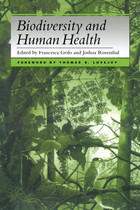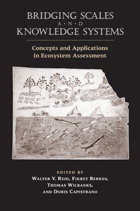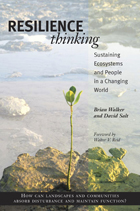
The implications of biodiversity loss for the global environment have been widely discussed, but only recently has attention been paid to its direct and serious effects on human health. Biodiversity loss affects the spread of human diseases, causes a loss of medical models, diminishes the supplies of raw materials for drug discovery and biotechnology, and threatens food production and water quality.
Biodiversity and Human Health brings together leading thinkers on the global environment and biomedicine to explore the human health consequences of the loss of biological diversity. Based on a two-day conference sponsored by the National Institutes of Health, the National Science Foundation, and the Smithsonian Institution, the book opens a dialogue among experts from the fields of public health, biology, epidemiology, botany, ecology, demography, and pharmacology on this vital but often neglected concern.
Contributors discuss the uses and significance of biodiversity to the practice of medicine today, and develop strategies for conservation of these critical resources. Topics examined include:
- the causes and consequences of biodiversity loss
- emerging infectious diseases and the loss of biodiversity
- the significance and use of both prescription and herbal biodiversity-derived remedies
- indigenous and local peoples and their health care systems
- sustainable use of biodiversity for medicine
- an agenda for the future
The book provides a common framework for physicians and biomedical researchers who wish to learn more about environmental concerns, and for members of the environmental community who desire a greater understanding of biomedical issues.

Contributors explore the challenges, costs, and benefits of bridging scales and knowledge systems in assessment processes and in resource management. Case studies look at a variety of efforts to bridge scales, providing important lessons concerning what has worked, what has not, and the costs and benefits associated with those efforts. Drawing on the groundbreaking work of the Millennium Eco-system Assessment, Bridging Scales and Knowledge Systems will be indispensable for future efforts to conduct ecosystem assessments around the world.

"Resilience thinking" offers a different way of understanding the world and a new approach to managing resources. It embraces human and natural systems as complex entities continually adapting through cycles of change, and seeks to understand the qualities of a system that must be maintained or enhanced in order to achieve sustainability. It explains why greater efficiency by itself cannot solve resource problems and offers a constructive alternative that opens up options rather than closing them down.
In Resilience Thinking, scientist Brian Walker and science writer David Salt present an accessible introduction to the emerging paradigm of resilience. The book arose out of appeals from colleagues in science and industry for a plainly written account of what resilience is all about and how a resilience approach differs from current practices. Rather than complicated theory, the book offers a conceptual overview along with five case studies of resilience thinking in the real world. It is an engaging and important work for anyone interested in managing risk in a complex world.
READERS
Browse our collection.
PUBLISHERS
See BiblioVault's publisher services.
STUDENT SERVICES
Files for college accessibility offices.
UChicago Accessibility Resources
home | accessibility | search | about | contact us
BiblioVault ® 2001 - 2024
The University of Chicago Press









